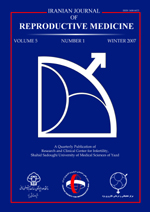
|
International Journal of Reproductive BioMedicine
Research and Clinical Center for Infertility, Shahid Sadoughi University of Medical Sciences of Yazd
ISSN: 1680-6433
EISSN: 1680-6433
Vol. 15, No. 12, 2017, pp. 779-786
|
 Bioline Code: rm17091
Bioline Code: rm17091
Full paper language: English
Document type: Research Article
Document available free of charge
|
|
|
International Journal of Reproductive BioMedicine, Vol. 15, No. 12, 2017, pp. 779-786
| en |
Supplementation of L-carnitine during in vitro maturation of mouse oocytes affects expression of genes involved in oocyte and embryo competence: An experimental study
Zare, Zohreh; Abouhamzeh, Beheshteh; Farahani, Reza Masteri; Salehi, Mohammad & Mohammadi, Moslem
Abstract
Background: Oocyte developmental competence is one of the key factors for
determining the success rate of assisted reproductive technique.
Objective: The aim of the current study was to investigate the effect of L-carnitine
(LC) supplementation during in vitro maturation (IVM), on preimplantation embryo
development and expression of genes involved in embryo competence derived from
oocytes selected with brilliant cresyl blue (BCB) test.
Materials and Methods: Cumulus-oocyte complexes (COCs) were obtained from
NMRI mice ovaries. COCs were stained with BCB and then BCB+ (colored
cytoplasm) oocytes cultured in IVM medium supplemented with 0.3 or 0.6 mg/ml
LC. COCs untreated with LC were used as control. Fertilization rate and blastocyst
development rate were determined after in vitro fertilization. In addition,
quantitative reverse transcriptase polymerase chain reaction was used to measure
relative genes expression related with development (Ccnb1, Mos, Ces5, and Dppa2)
and apoptosis (Bax and Bcl-xL) in oocytes and embryos.
Results: Oocytes treated with both LC concentrations showed higher blastocyst
development rate compared with untreated oocytes (p<0.01). Moreover, fertilization
rate was increased in oocytes treated with 0.6 mg/ml LC (p<0.01). Treatment of
oocytes with both LC concentrations increased (p<0.01) the level of Ccnb1 mRNA
in MII oocytes. The two-cell stage embryos and blastocysts derived from LC-treated
oocytes (0.6 mg/ml) showed increased the expression levels of Dppa2 and Bcl-xl
mRNA, respectively (p<0.01).
Conclusion: The results of the present study show that adding of LC to the IVM
medium of BCB+ oocytes can ameliorate reproductive success following in vitro
fertilization.
Keywords
L-carnitine; In vitro fertilization; Oocyte; Gene expression.
|
| |
© Copyright 2017 - International Journal of Reproductive BioMedicine
Alternative site location: http://www.ijrm.ir
|
|
